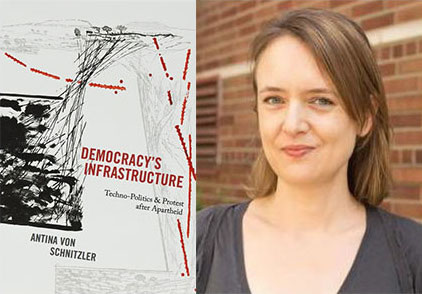
International Affairs Prof Antina von Schnitzler Launches ‘Democracy’s Infrastructure’ Book
In the past decade, South Africa’s “miracle transition” has been interrupted by waves of protests related to basic services such as water and electricity. Less visibly, the post-apartheid period has witnessed widespread illicit acts involving infrastructure, including the nonpayment of service charges, the bypassing of metering devices, and illegal connections to services.
In Democracy’s Infrastructure Techno-Politics & Protest After Apartheid, Antina von Schnitzler, professor of International Affairs, shows how such administrative links to the state became a central political terrain during the antiapartheid struggle and how this terrain persists in the post-apartheid present.
Von Schnitzler will celebrate the release of the book with a launch event on Wednesday, November 2, 6-8 pm in the Orozco Room, Alvin Johnson/J.M. Kaplan Hall, 66 West 12th Street.
Von Schnitzler’s work on Democracy’s Infrastructure was funded by a Wenner-Gren Hunt Postdoctoral Fellowship. She is currently working on a new research project on coal and energy politics in South Africa.
The following is more about the book:
Focusing on conflicts surrounding prepaid water meters, von Schnitzler examines the techno-political forms through which democracy takes shape. Von Schnitzler explores a controversial project to install prepaid water meters in Soweto—one of many efforts to curb the nonpayment of service charges that began during the antiapartheid struggle—and she traces how infrastructure, payment, and technical procedures become sites where citizenship is mediated and contested. She follows engineers, utility officials, and local bureaucrats as they consider ways to prompt Sowetans to pay for water, and she shows how local residents and activists wrestle with the constraints imposed by meters. This investigation of democracy from the perspective of infrastructure reframes the conventional story of South Africa’s transition, foregrounding the less visible remainders of apartheid and challenging readers to think in more material terms about citizenship and activism in the postcolonial world. Democracy’s Infrastructure examines how seemingly mundane technological domains become charged territory for struggles over South Africa’s political transformation.